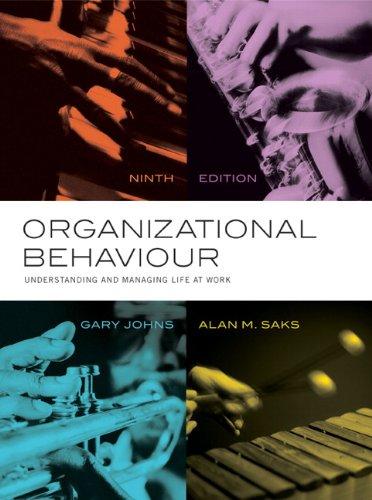The purpose of this exercise is to explore the portrayal of organizational behaviour on television. Most experts
Question:
The purpose of this exercise is to explore the portrayal of organizational behaviour on television. Most experts on the function of TV as a communication medium agree on two points. First, although TV may present an inaccurate or distorted view of many specific events, the overall content of TV programming does accurately reflect the general values and concerns of society. Second, TV has the power to shape the attitudes and expectations of viewers. If this is so, we should pay some attention to the portrayal of work and organizational behaviour on TV.
Prepare this exercise before its assigned class:
1. Choose a prime-time TV show that interests you. (This means a show that airs between 8 p.m. and 10 p.m. in your viewing area. If your schedule prohibits this, choose another time.) The show in question could be a comedy, a drama, or a documentary, for example, Mr. D, Republic of Doyle, CSI, or Marketplace. Your instructor may give you more specific instructions about what to watch.
2. Ona piece of paper, list the name of the program and its date and time of broadcast. Write the answers to the following questions during or immediately following the broadcast:
a. What industry is the primary focus of the program? Use the following list to categorize your answer: agriculture; mining; construction; manufacturing; transportation; communication; wholesale trade; retail trade; finance; service; public administration. Examples of service industries include hotel, health, law, education, newspaper, entertainment, and private investigation. Examples of public administration include justice, police work, and national security.
b. What industries or occupations are of secondary focus in the program?
c. What exact job categories or occupational roles do the main characters in the program play? Use this list to categorize your answers: managerial; clerical; professional; sales; service; craftsperson; machine operator; labourer; law enforcement, military personnel; customer/patient/client; homemaker.
d. Write several paragraphs describing how organizational life is portrayed in the program. For example, is it fun or boring? Does it involve conflict or cooperation? Are people treated fairly? Do they seem motivated? Is work life stressful?
e. What aspects of the TV portrayal of organizational behaviour do you think were realistic? Which were unrealistic?
3. Be prepared to discuss your findings in class. Your instructor will have some research information about how organizational life has actually been portrayed on TV over the years.
Step by Step Answer:

Organizational Behaviour Understanding And Managing Life At Work
ISBN: 9780133347500
9th Edition
Authors: Gary Johns, Alan M. Saks





